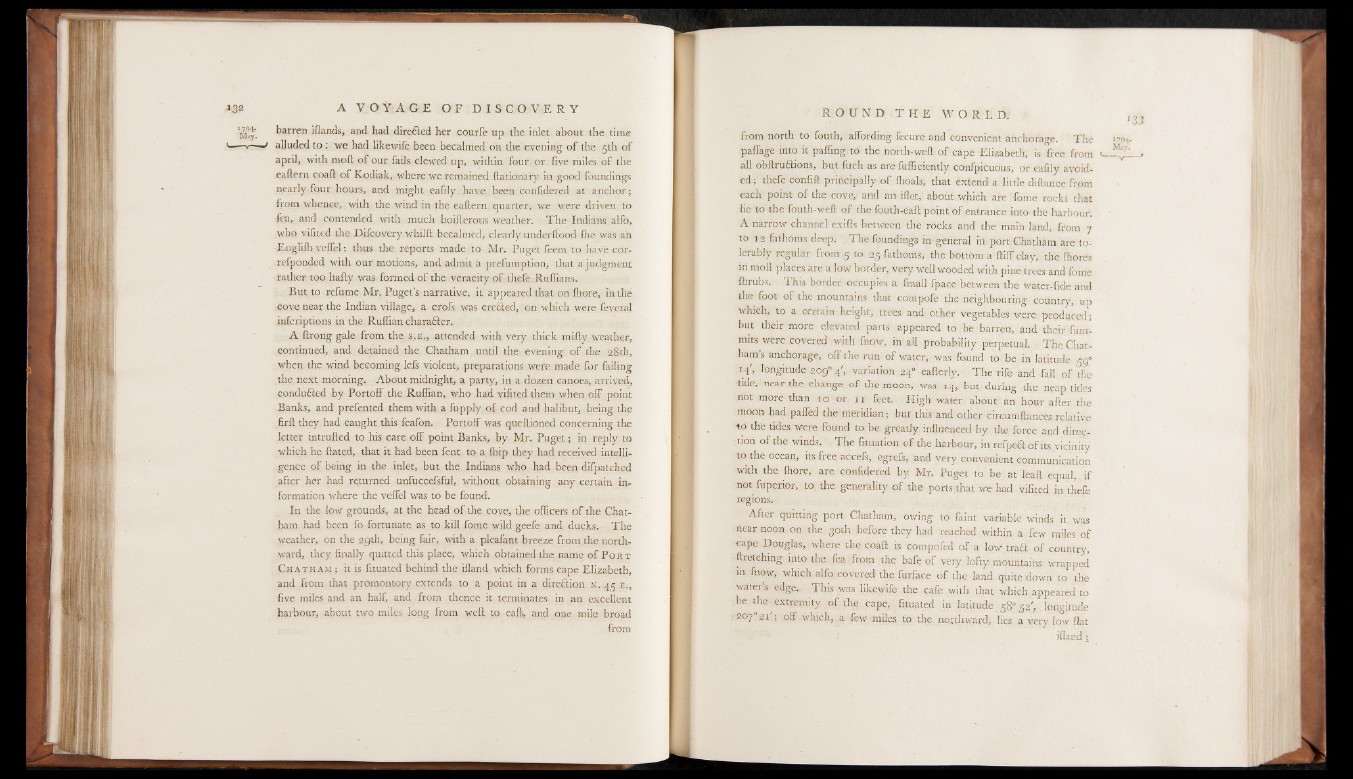
barren iflands, and had direfted her eourfe up the. inlet about the time
alluded to : we had likewife been becalmed on the evening of the 5th of
april, with moll of our fails clewed up, within four or five miles of the
eaftern coaft of Kodiak, where we remained flationary in good foundings
nearly four hours, and might eafily have been cpnfidered at anchor;
from whence, with the wind in the eaftern quarter, we were driven to
fea, and contended with much boifterous weather. The Indians alfo,
who vilited the Difcovery whilft becalmed, clearly underft'ood fhe was an
E-nglifli veffel; thus the, reports made to Mr. Puget feem to havé cor-
refponded with our motions, and admit a prefumption, that a judgment
rather too hafty was formed of the veracity of thefe Ruffians.
But to refume Mr. Puget’s narrative, it appeared that on fltore, In the
.cove near the Indian village, a crofs, was eretled, on which were feveral
infcriptions in the Ruffian charafter.
A ftrong gale from the s.e., attended with very thick mifty. weather,
continued, and detained the Chatham until the evening of the 28th,
when the wind becoming leis violent, preparations were made for failing
the next morning. About midnight, a party, in a dozen canoes, arrived,
conducted by PortofF the Ruflian, who had. vifited them when off point
Banks, and prefented them with a fupply .of cod and halibut, being the
firftthey had caught this feafon. PortofF was queftioned concerning the
letter intrufted to his care off point Banks, by Mr. Puget; in reply to
which he ftated, that it had been fent to a fhip they had received intelligence
of being in the inlet, but the Indians who had been difpatehed
after her had returned unfuccefsful, without obtaining any certain information
where the veffel was to be found.
In the low grounds, at the head' of the cove, the officers o f the Chatham
had been fo fortunate as to kill fome wild geefe and ducks. The
weather, on the 29th, being fair, with a pleafant breeze from the northward,
they finally quitted this place, which obtained the name of P ort
C hatham ; it is fituated behind the ifland which forms-cape Elizabeth,
and from that promontory extends to a point in a direflion N-.-45 e„
five miles and an half, and from thence it terminates in an excellent
harbour, about two miles long from weft to eaft, and one mile broad
from
from north to fouth, affording fecure and convenient anchorage. Thé ,794.
paffage into it palling to the north-weft of cape Elizabeth, is free from
all obftru&ions, but fuch as are fufficiendy qonfpicuous, or eafily avoided
; thefe confift principally of fhoals, that extend a little diftance from
each point of the- cove,: and an iflet,' about which are fome rocks that
lie to the fouth-weft of the fouth-ëaft point of entrance into the harbour.
A narrow channel exifts between the rocks and the main land, from 7
to 12 fathoms deep. The foundings in general in port Chatham are tolerably
regular from 5 to 25-fathoms, the bottom a ftiffclay, the fhorës
in moft places are, a low border, very Well wooded with pine trees and fome
fhrubs.- This border'.occupies a fmall fpace between the water-fide and
the foot of the mountains that compofe the neighbouring country, up
which, to a certain height, trees-and. Other vegetables were produced;
but their more elevated parts appeared to be barren, and their fum-
mits were covered with fnow, in all probability perpetual. The Chatham’s
anchorage, off the run- of water, was found to be, in latitude- 59»
14', longitude 209" 4', variation 240 eafterly. The-rife and fall of the
tide, near the change o f the moon, was 1-4, but during the neap tides
not more than 10 or 11 feet. High water about an hour after the
moon had paffed the meridian; but' this and other circumftances relative
•to' the tides Were found to be greatly influenced by the force and direction
of the winds. ' The fituation of the harbour, in refpea of its’ vicinity
to the ocean, its free accefs, egrefs, and very convenient communication
with the fhore, are confidered by Mr. Puget to be at leaf! equal, if
not fuperior, to. the generality of the ports that we had vifited in thefe
regions.
After quitting port Chatham, owing to faint variable winds it was
near noon on the' 30th before they had reached within a few miles of
cape Douglas, where the coaft is compofed of a low traft of country,
ftretching into the fea from the bafe of very lofty mountains wrapped
in fnow, which alfo covered the furface of the land quite down to the
water’s- edge.. This was likewife the cafe with that which appeared to
.be therextremity of the cape, fituated in latitude . 58° 52', longitude
:2ö7°2l'; off which, a few miles to the northward, lies a very low flat
ifland 1